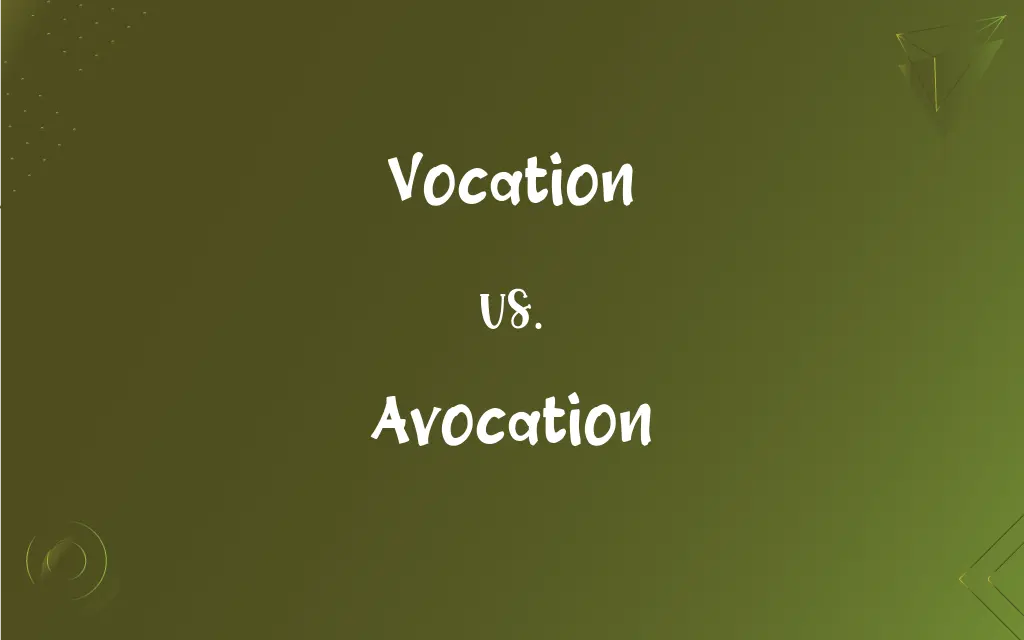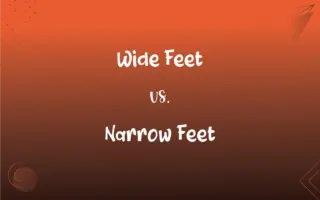Vocation vs. Avocation: What's the Difference?
Edited by Janet White || By Harlon Moss || Updated on November 25, 2023
Vocation is one's primary profession or calling, often driven by passion or purpose; avocation is a secondary activity or hobby pursued outside of one's main occupation.

Key Differences
Vocation often refers to a chosen profession or occupation that aligns with one's passion or purpose in life. Avocation, in contrast, pertains to hobbies or secondary activities that one indulges in, separate from their main job.
While a vocation typically implies a deeper calling or inherent inclination towards a particular job or career, avocation represents interests or hobbies that might be pursued for pleasure or relaxation.
Generally, one's vocation is the primary source of income and is central to their livelihood. On the other hand, an avocation might not necessarily bring in money and is often pursued for personal satisfaction.
Vocation often demands a significant amount of time, given its role as a primary occupation. Avocation, being a secondary or leisure activity, might be indulged in during one's free time or weekends.
A person might consider teaching as their vocation, feeling a strong connection and commitment to educating others. Reading or painting, for that same individual, might be an avocation that provides a break from their regular job.
ADVERTISEMENT
Comparison Chart
Definition
One's main profession or occupation.
A hobby or secondary activity.
Income Generation
Typically a primary source of income.
Often not a significant source of income.
Time Commitment
Demands substantial time and commitment.
Pursued during leisure or free time.
Purpose
Aligns with passion or a deeper calling.
Pursued for pleasure, relaxation, or personal interest.
Examples
Teaching, medicine, engineering.
Painting, reading, gardening.
ADVERTISEMENT
Vocation and Avocation Definitions
Vocation
A particular occupation or profession, especially one regarded as a calling.
She felt that nursing was her vocation, a true calling to help others.
Avocation
A hobby or secondary occupation.
Gardening became his favorite avocation after retirement.
Vocation
The work in which a person is primarily employed.
His vocation as a mechanic allowed him to provide for his family.
Avocation
An interest or activity followed outside one's regular occupation.
Traveling was more than a hobby; it was an avocation she deeply cherished.
Vocation
A primary employment chosen out of passion or purpose.
Many artists pursue their craft as both a passion and a vocation.
Avocation
A leisure activity that provides relaxation or diversion.
Bird-watching was an avocation that brought her much joy and peace.
Vocation
The main activity for which a person is trained and employed.
Counseling was her vocation, a field she entered with dedication and empathy.
Avocation
An activity pursued for pleasure, not as a main occupation.
While she worked in finance, her avocation was photography.
Vocation
A strong impulse or inclination to follow a particular profession or calling.
From a young age, he felt a vocation to join the priesthood.
Avocation
A pursuit outside one's primary job for personal satisfaction.
While programming was his job, playing the guitar was his avocation.
Vocation
A regular occupation, especially one for which a person is particularly suited or qualified.
Avocation
An activity taken up in addition to one's regular work or profession, usually for enjoyment; a hobby.
Vocation
An inclination or aptness for a certain kind of work
A vocation for medicine.
Avocation
(obsolete) A calling away; a diversion.
Vocation
(Theology) A calling of an individual by God, especially for a religious career.
Avocation
A hobby or recreational or leisure pursuit.
FAQs
Can someone turn an avocation into a vocation?
Yes, if they pursue their hobby or interest as their primary profession.
What is the primary difference between vocation and avocation?
Vocation is one's main profession, while avocation is a hobby or secondary activity.
Is vocation always tied to income?
Typically, yes, as it's one's primary occupation and source of livelihood.
How does avocation contribute to one's well-being?
Avocation provides relaxation, pleasure, and a break from routine, enhancing well-being.
Is it essential to have an avocation?
Not essential, but having an avocation can improve work-life balance and mental health.
Can an avocation become more time-consuming than a vocation?
It's possible, especially if one is deeply passionate about their avocation.
How can one find their true vocation?
By exploring passions, strengths, and where they find purpose or fulfillment.
Is it common for people to change vocations mid-career?
While challenging, many people change vocations seeking satisfaction or new challenges.
Can an avocation generate income?
While it's often pursued for pleasure, an avocation can sometimes generate income.
Can a person have multiple vocations?
While rare, some people might juggle multiple professions or vocations.
Is avocation just another term for hobby?
Essentially, yes, but avocation might imply a deeper or more committed interest than a casual hobby.
Can avocations have positive impacts on one's vocation?
Yes, avocations can provide a refreshing break, leading to increased productivity in one's vocation.
Is the line between vocation and avocation always clear?
Not always; sometimes, the boundaries can blur, especially if one is passionate about both.
Does vocation always align with one's passion?
Ideally, yes, but not everyone's vocation is their passion.
Can one's vocation and avocation be related?
Yes, for instance, a music teacher's vocation can be teaching, and their avocation playing in a band.
How does society view vocation and avocation?
While vocations are often tied to social roles and responsibilities, avocations are seen as personal interests.
Why might someone not pursue their passion as their vocation?
Practical reasons, such as financial stability, might deter someone from making their passion their vocation.
Do people always need an avocation outside of their vocation?
Not always, but having an avocation can offer a constructive diversion and enhance work-life balance.
Can avocations evolve over time?
Absolutely, as people's interests and circumstances change, so can their avocations.
Are vocation and avocation terms used globally?
While the concepts are universal, the specific terms might vary across cultures and languages.
About Author
Written by
Harlon MossHarlon is a seasoned quality moderator and accomplished content writer for Difference Wiki. An alumnus of the prestigious University of California, he earned his degree in Computer Science. Leveraging his academic background, Harlon brings a meticulous and informed perspective to his work, ensuring content accuracy and excellence.
Edited by
Janet WhiteJanet White has been an esteemed writer and blogger for Difference Wiki. Holding a Master's degree in Science and Medical Journalism from the prestigious Boston University, she has consistently demonstrated her expertise and passion for her field. When she's not immersed in her work, Janet relishes her time exercising, delving into a good book, and cherishing moments with friends and family.































































